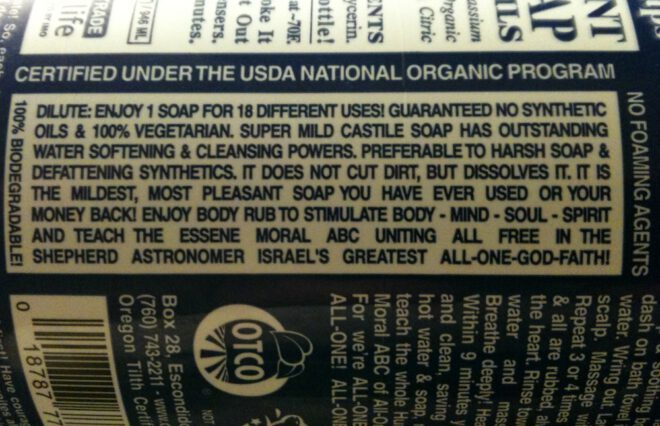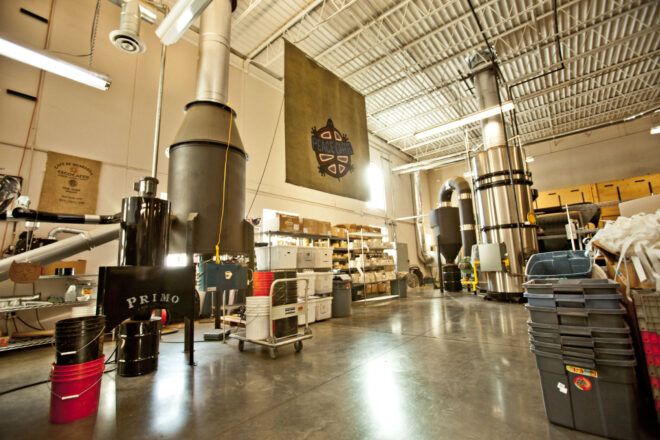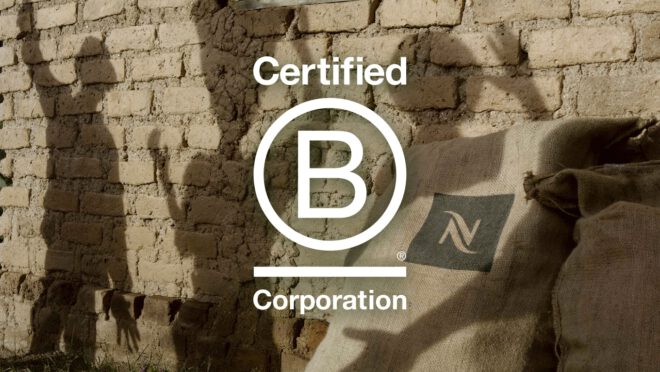For some years having a B Corp certification in the United States meant you were leading the competition on how to build a sustainable business. Is it organic? Do you pay your adult workers a fair wage? Are you reducing the carbon cycle of your product in a meaningful way? Can you see 100 years into the future? If you passed a series of challenges, and paid the yearly dues, you could join the B Corp club.
But the Fair World Project – a fair trade advocacy organization and certification watchdog – is calling bluff on B Corp. By letting Nespresso wear the badge of honor as a B Corp company, they petition, the trusted B Corp label is no longer meaningful.
“There’s a long history of certifications getting co-opted by corporations as they reach the mainstream,” says Dana Geffner, Executive Director of Fair World Project. “We’ve seen it with fair trade certification as well as with organics. Unfortunately, Nespresso’s certification suggests that B Corp Certification is heading that way as well.”
Among those calling to retract B Corp status from Nespresso, which makes the polluting coffee pods, are other ethical coffee brands and sustainable businesses such as Cooperative Coffees, Exilior Coffee, Peace Coffee, and Thanksgiving Coffee Company.

Dr. Bronner soap. 18 uses. 18 is also the Hebrew number for “chai” symbolizing life.
Dr. Bronner’s, Grove Collaborative, LAUDE the Label, and Lotus Foods have also signed the letter to B Lab Global, the organization that runs the B Corp certification process and label.
Here is the Nespresso B Corp marketing page they list on their site with a score of 84.
The companies against Nespresso joining as a B Corp collectively write:
“The fact that Nespresso can achieve a score that allows them to be certified as a B Corp and use the Certification to greenwash its business model and practices demonstrates that the B Impact Assessment scoring system and certification process is in serious need of repair.”
Nespresso produces single-serve coffee capsules. George Clooney who is a part owner of the company along with Nestlé is “saddened by child labor on Nespresso farms’ – article from 2020. While they do provide a bag to encourage recycling of their pods, few people bother to do it. But there are bigger problems than that:
Nespresso received B Corp status on May 2022 and this is “despite a recent history of human rights violations on farms that grow their coffee including child labor, wage theft, and abuse of factory workers,” writes the Fair World Project in a press briefing they sent Green Prophet.
B Lab, a non-profit organization, created and awards the B Corp certification to for-profit companies that voluntarily meet certain standards of transparency, accountability, sustainability, and performance, with an aim to “Be a Force for Good” in the business community and create value for society beyond shareholder profits.
How can coffee do it better?
One example: In 2018, Peace Coffee was named among B Lab’s “Best For Community” list, which includes businesses that earned a Community score in the top 10 percent on the B Impact Assessment.

Peace Coffee delivers by bike
“We take the commitment to be ‘In it for Good’ seriously,” says Lee Wallace,” CEO of Peace Coffee. “It shapes every aspect of our business, from the way we reinvest profits with the farmer cooperatives who grow our coffee to our commitment to bike delivery and giving back to our local community. That’s not been the norm in a coffee industry historically defined by the likes of Nestlé’s Nespresso—but we think it should be.”

Brewing peace, at Peace Coffee
The Fair World Project members say they are concerned and that Certified B Corp brands should hold higher standards to avoid “greenwashing” by the certification. They are calling that the greater Certified B Corp community demand the same.
“B Corp certification should take account of historically exploitative companies who do not take care of the people and communities impacted by their supply chains,” says David Bronner, CEO of Dr. Bronner’s, the top-selling natural brand of soap in North America and third-highest scoring Certified B Corp overall, who also signed onto the letter.
“The entire fair trade movement was born to address inequities and exploitation in the coffee supply chains of major CPGs like Nestlé, Nespresso’s parent. Given Nespresso’s recent and egregious track record of sourcing from coffee farms engaging in documented human rights abuses, it is disappointing that the brand was granted B Corp status.”
How can B Corps do better? Fair World offers some ideas:
- Rather than a minimum total score, there must be minimum scores per Impact Business Model and per applicable Score Area.
- The B Corp Standard must center human rights in the Supply Chain Impact Business Model and reference the UN Guiding Principles on Business Human Rights framework, including a company’s responsibility to respect human rights and provide remedy and remediation for harms.
- Unless there is demonstrated evidence of remedy and remediation for harms, and course correction to prevent future harm, human rights abuses should be a non-negotiable Disqualification Factor preventing certification.
- Sourcing a majority of raw materials from non-fair trade certified supply chains, CAFOs, or industrial farming systems should be added as Risk Factors for consumer goods companies, requiring documented improvement over time.
- Risk Factors must be reflected in scores, monitored closely over time for required improvement, and re-certification should be contingent on demonstrated improvement. If Risk Factors are not corrected over time, re-certification should be withheld.”
After the announcement was made that Nespresso received B Corp Certification, Fair World Project published “Nespresso: Known for Human Rights Violations, Now B Corp Certified,” an article further detailing the issues surrounding the company’s dismal track record on human rights and the environment, authored by Anna Canning, Campaigns Manager of Fair World Project.
“We’re seeing a grim trend of B Corp certified companies engaging in union-busting and other violations of working people’s fundamental rights,” says Canning. “Is B Lab going to take action, or is their certification going to become yet another way for companies to rebrand the exploitative status quo as ethical?”
Are you a registered B Corp against Nespresso joining your league? Sign the petition here.
We’ve reached out to Nespresso for comment.




